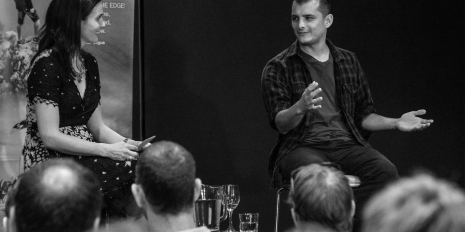
Image: Tina Jennen interviews Derek Handley. Photo credit: Scott White
A graduate of Architecture, Design and Marketing, his entrepreneurial career had the early failure component like most of the great success stories. Following this in 2000 he started Hyperfactory with his brothers, a pioneering advertising agency focused on delivering mobile content to engage consumers.
His target from day one was to take Hyperfactory global. Working in the same building as TradeMe (the very early days) he was fascinated why Sam Morgan was going to constrain his venture solely to New Zealand when the globally opportunity is so much richer. He chuckled at the fact that Sam Morgan went onto sell TradeMe for $750M.
Hyperfactory was enormously successful with offices worldwide working with the world's largest brands and in 2009 sold for an undisclosed multi-million dollar deal to US media giant Meredith.
Plan A
The Hyperfactory years however was the past and what Derek referred to as an era of traditional business thinking. The kind of thinking that makes companies bigger than countries, the kind of thinking focusses businesses on 'creating money, raising capital and raising debt'. 'Capitalism hasn't solved the problem and Governments are running out of money' he pointed out.
The traditional approach of pursing short term profit, Plan A, wasn’t working and wasn’t sustainable – “like giving $100M to Sky City; we shouldn’t be doing it”.
Plan B
When Hyperfactory hit the wall in 2008 that he was forced to rethink the model and recognised that while business and entrepreneurship are the most powerful and inspiring forces of progress, businesses today have a far greater responsibility than purely financial profit. ‘Success is interesting, but significance is more so’.
He spent 2011 forming The B-Team with Sir Richard Branson – a non-profit initiative focussed on developing a blueprint (Plan B) for business that prioritises social, environmental and economic factors. The B-Team is formed from a collective of global business leaders focussed on solving the world’s biggest problems. Benefit Corporations in the US is a class of corporation, pioneered by the B-Lab (not the B-Team) that mandates that companies and their boards take into account public benefits that impact society and the environment when making decisions. The system gives these businesses legal security to make decisions that benefit non-financial objectives in place of the bottom line.
New Models
Derek referred to himself as a provocateur of new models. The B-Team is changing the model that businesses use to measure success but education was also up for debate. “Measuring success at school with grades is crazy”, making the point that many other factors can contribute to success at school. He also advocated Design Thinking being a core subject at school to foster the big-problem solving thinking.
Other key threads:
Impressive thinking from a humble astronaut.
Comments
Post new comment